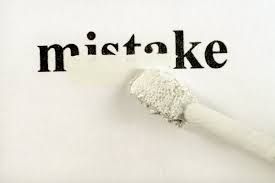Five Common Bookkeeping Mistakes And How To Avoid Them
By: Rachel Raupp
Mistakes can happen in your books, no matter who you are. It’s important to know why your mistake happened and how they can be avoided.

- Deposits don’t match bank account
Many times deposits are recorded in QuickBooks on multiple lines when, in fact, only one deposit reaches the bank. Your books should match your bank account exactly.
- Double recording of income
Clients will mark an invoice as paid and put it into Undeposited Funds, then they’ll remember they went to the bank and made a deposit so they create another entry to record this activity when they should have only made one entry moving the money from Undeposited Funds into the bank.
- Double recording of credit card transactions
This happens most often when you’re relying on a bank/credit card download to record your transactions. Many times people will record two transactions – a payment from the bank to the credit card AND a payment on the credit card from the bank. When this happens, the money comes out of the bank twice and the credit card is paid twice although it only happened once. The single transaction needs to be recognized in both accounts.
- Not reconciling accounts
It’s important to reconcile accounts on a monthly basis to ensure that what you had has cleared has actually cleared. This includes bank, credit card, loans, and liabilities (sales tax/payroll tax, other payroll obligations). Mistakes happen, either in your books or at the bank, which is why it’s important to reconcile your accounts. Previously, a client wrote a check for $150 but the “1” was right on the line of the “Amount Box” on the check, so the bank thought it was for $50 and cashed it for $50. This took three months to clear up.
- Not backing up properly
This is in regards to QuickBooks Desktop. You should be making regular backups of your data to another location. We recommend monthly. A great option is one of the many cloud storage solutions. If your computer crashes, there’s or fire, or any other unfortunate event, you can rest easy knowing you can restore your information to a new computer because you had backed up regularly.
.png?token=6adcf38ed58846e4f05e97718ba6eb6d)